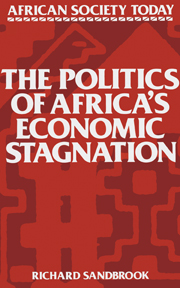Book contents
- Frontmatter
- Contents
- List of tables
- Acknowledgements
- Glossary
- Map: African states and principal cities
- 1 Disappointments of independence
- 2 Why capitalism fails
- 3 Colonial roots of the contemporary crisis
- 4 Class, tribe and politics
- 5 Anatomy of personal rule
- 6 The downward spiral
- 7 Survival strategies
- Notes
- Guide to further reading
- Index
- Farm Labour
6 - The downward spiral
Published online by Cambridge University Press: 01 June 2011
- Frontmatter
- Contents
- List of tables
- Acknowledgements
- Glossary
- Map: African states and principal cities
- 1 Disappointments of independence
- 2 Why capitalism fails
- 3 Colonial roots of the contemporary crisis
- 4 Class, tribe and politics
- 5 Anatomy of personal rule
- 6 The downward spiral
- 7 Survival strategies
- Notes
- Guide to further reading
- Index
- Farm Labour
Summary
Downward spiral – Ghanaians, Nigerians, Zairois, Zambians, Sudanese, Tanzanians, Kenyans, Ugandans may not describe their predicament in this way. Yet they are brutally familiar with the phenomenon to which the term refers. State decay, economic decline and the rise of the black market are the prime features. They are, moreover, intimately interrelated.
Zaire, once again, provides a dramatic example. The decline of the state since independence, manifest in enormous corruption, maladministration, arbitrary use of authority and deterioration of public services, produced unconducive conditions for economic growth. By 1980, the state resembled nothing more than an organization of profiteers whose sole shared goal was the use of public office for personal enrichment. While Mobutu's clique reaped rich harvests and invested millions of dollars in secure countries abroad, the modern economy languished. Large-scale capitalist firms could prosper only where they were able to profit from monopoly conditions or exploit mineral reserves within carefully protected enclaves. Agriculture, the livelihood of the vast majority, increasingly reverted to subsistence.
In desperation, those excluded from the charmed political circle turned to the parallel economy. Enormous price inflation in relation to wages and the unavailabiltiy of many goods at controlled prices meant that workers could not feed, house and clothe their families. To survive, black marketing was essential. The informal economy thus boomed in the 1970s despite the state.
- Type
- Chapter
- Information
- The Politics of Africa's Economic Stagnation , pp. 112 - 144Publisher: Cambridge University PressPrint publication year: 1985



